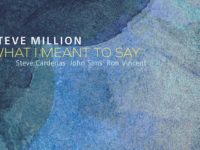by Pico
Last year I devoted precious little space to praise a then-new album by bassist-composer Ben Allison called Little Things Run The World. The brief praise didn’t really do the record justice, as Allison is a certain kind of composer and bandleader who can build rib-sticking compositions and find the right combination of musical personalities to make them sound easy to listen to and engaging all the same.
Allison must have been pleased with Little Things, too, as he went back to the studio just last June to record its follow up Think Free out last week. Allison’s career goes much further back than last year’s release, though, as his first record appeared in 1995. Just a few years before that, Allison helped to found the Jazz Composers Collective, a nonprofit confederation of musicians that support projects and concerts that honor and promote modern and avant garde jazz. Allison’s own records have never been all that “outside” but nevertheless very modern and complex. He has a restless soul as his records have shifted gears from advanced bop and chamber jazz to jazz with hip-hop and African elements.
Lately, Allison has settled into an aesthetic that values rock and funk virtues as much as jazz. That mode began with 2006’s Cowboy Justice and got going in earnest with the aforementioned Little Things. Think Free continues along the same path. As Allison put it, “I was moving away from the chamber-jazz elements of (my prior bands) Medicine Wheel and Peace Pipe and trying to incorporate other sounds into my music. I continue to try to get to something personal. Cowboy Justice, Little Things Run The World, and now Think Free are all one continuous train of thought.” He also allowed that he “wanted a band that rocked.”
Carrying over the trumpet/bass/electric guitar/drums combination from the prior two records but retaining only guitarist Steve Cardenas, Allison adds a violinist Jenny Scheinman to his group, a key addition. Shane Endsley (trumpet) and Rudy Royston (drums) round out the quintet. I say Scheinmann’s presence is key because she deftly uses her violin as a bridge of sorts between Endsley’s airy trumpet and Cardenas crunchy guitar. It fills out the character of Allison’s music and makes it harder to define; it’s comfortable but you’d be hard pressed to call this “jazz” or “rock fusion” or some other moniker even though it clearly contains ingredients from those and other sources.
The slightly heftier sound pays off right from the top; “Fred,” with an arrangement that bears more than a passing resemblance to Fleetwood Mac’s “Dreams,” percolates on a mid-tempo California rock groove. Endsley carries the melody, but Schheiman soon join him in harmony and takes an unhurried but well-defined solo that blurs whatever lines the listener tries to draw in this song. “Platypus,” a tribute to Charles Darwin, is a somber melody riding on 7/4 timekeeping. This time, the violin doubles up with Cardenas as Allison and Royston lock down the uneven rhythm. It builds in intensity for Cardenas’ rock guitar solo, which instead of devolving into a mindless wailfest as many would have tempted to do, he stays focused on beautiful chord progression that Allison has set up.
The genteel and rural “Broke” calls to mind some of Bill Frisell’s more folkish numbers. The muted trumpet and violin combine for harmonies that hints at Allison’s chamber jazz side. “Kramer vs. Kramer vs. Godzillia” is a malevolent post-rock number that feeds from Allison’s repeating-note pulses and Cardena’s shimmering guitar. Sheinman’s violin turns a little wicked to match the dark, slow vibe .
The rest of the songs are also Allison originals, but have first appeared on prior albums. “Sleeping Giant,” a remake of “R&B Fantasy” from Buzz, pushes the limits of tonality, as Royston puts in some nice work on the tom-toms and Endsley shifts seamlessly between muted and unmuted horn. “Peace Pipe” is most intriguing for Scheinman’s ability to mimic exotic instruments (the earlier version of this song featured a kora and at times, her violin sounds even more like a kora than the real thing). “Green Al” is not quite as soulful as the rearranged namesake, but it possesses a sunny melody and a gentle funk groove. If I’m not mistaken, it’s also where Allison finally takes a solo himself, something he has been less inclined to do as he clearly enjoys leading a democratic group in pursuit of the best rendering of his compositions.
After a well-realized CD such as Little Things Rule The World, I didn’t really want Ben Allison to change things too much for his next album. He didn’t, and the tweaks he made for Think Free only enhanced his personal approach further. Not allowing himself to be boxed in by artificial definitions what makes music one style or another, Allison is saying the same message in his music as he does with this album’s title.
- Claudio Scolari Project – ‘Bloom’ (2025) - June 12, 2025
- Denny Zeitlin – ‘With a Song In My Heart: Exploring The Music of Richard Rodgers’ (2025) - June 4, 2025
- Ches Smith Quartet – ‘Clone Row’ (2025) - May 30, 2025



